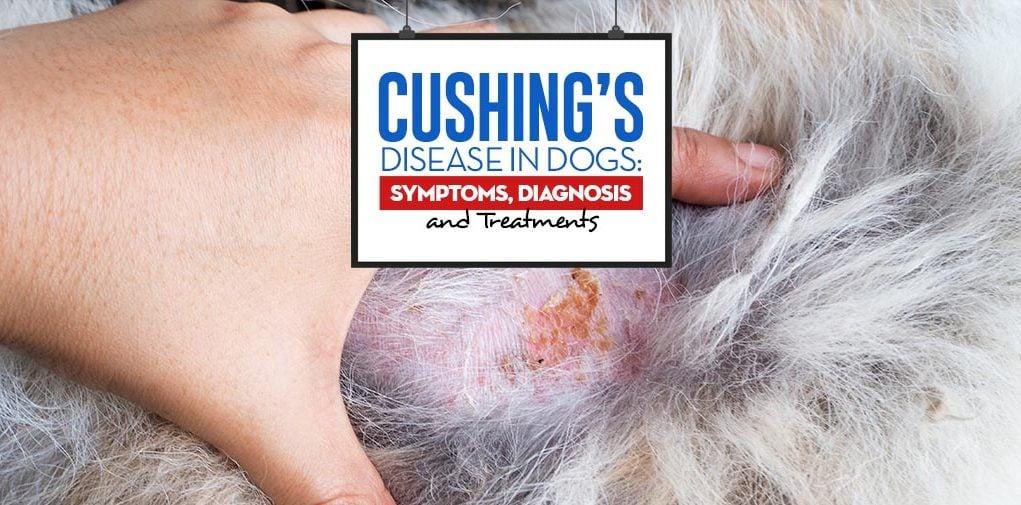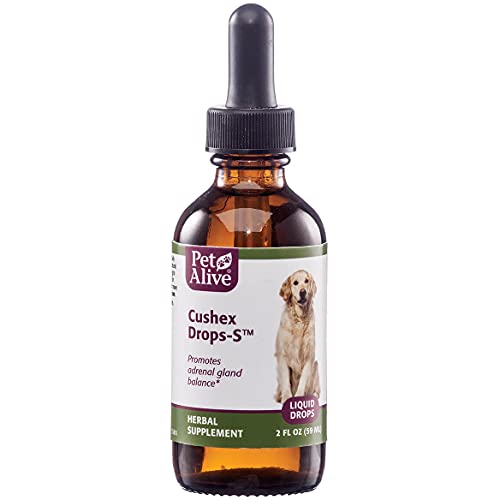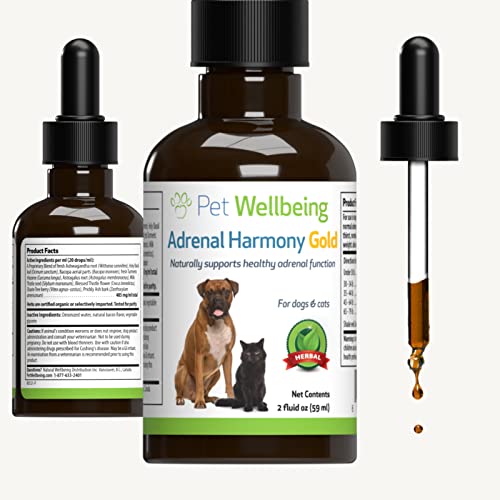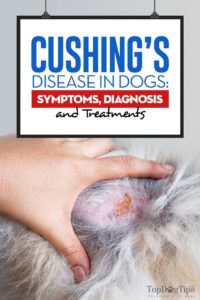If you're not familiar with the condition, Cushing's Disease, also known as Cushing's Syndrome in dogs, results from excessive production of cortisol in their body.
Cushing's disease is usually caused when a tumor has formed in a pea-sized gland called the pituitary gland.
The adrenal glands or pituitary glands produce this particular hormone.
The cortisol's primary role is to assist your dog in responding to stress, but it also keeps its immune system healthy by regulating your dog's metabolism.
There are three types of Cushing's Disease, all of which have different causes:
- Pituitary-Dependent Hyperadrenocorticism (PDH) or Pituitary dependent Cushing's Disease
- Adrenal-Dependent Hyperadrenocorticism (ADH) or Adrenal-dependent Cushing's Disease
- Iatrogenic Hyperadrenocorticism (IHAC) or Iatrogenic Cushing's Disease.
PDH focuses on the tumor within the pituitary gland, while ADH focuses on the adrenal gland.
This disease is most prevalent in older dogs, but you can also see the disease in humans with similar symptoms.
Symptoms of Cushing's Disease in dogs include:
- excessive or constant panting
- increased appetite
- potbelly appearance
- extreme unquenchable thirst
- the slow hair growth or hair loss
- skin infections
- frequent urination
- has thinning skin
- weak and inactive
The primary treatment for Cushing's Disease in dogs is usually surgery.
If the pituitary gland tumor or adrenal gland tumor is not cancerous, your veterinarian will ordinarily be able to remove it.
After removal, your dog should regain normal health.
However, with older dogs or inoperable cases, holistic and medical treatments are available to manage the symptoms of Cushing's Syndrome well.
According to veterinarians, one of the most promising treatments, and the easiest for you to do, is to cook homemade dog food for your pet.
By switching your dog to homemade diet recipes, plenty of which you can find here, and feeding the dog at frequent intervals, you'll help him substantially decrease these problematic symptoms.
That's a brief overview of Cushing's Disease in dogs, but there is a lot more you need to know if you know or suspect your dog may have the condition.
This article will explain more about the disease, the breeds that suffer from a genetic predisposition, and the best diet for a dog diagnosed with Cushing's Disease.
RELATED: A Science-based Guide to Home Cooked Dog Food Recipes
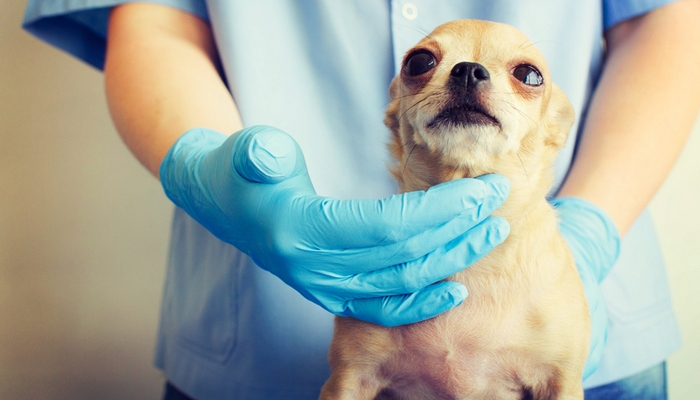
Before we get into the treatments, pet owners need to understand the basics of dogs with Cushing's syndrome and what the causes are.
What is Cushing's Disease in Dogs?
According to research, Cushing's Disease, or Hyperadrenocorticism (HAC), is one of canines' most common endocrine system disorders.
It's a condition with excessive cortisol production in the body.
There are three types of it, each of which has specific reasons.
However, there are two primary forms of Cushing's Syndrome, endogenous and exogenous.
Under endogenous form is Pituitary-Dependent Hyperadrenocorticism (PDH) or pituitary dependent cushing's disease, which involves functional adenoma or the slow growth on the pituitary.
It is typically benign or non-cancerous and is quite common among 80% to 90% of animals, especially dogs and horses.
The tumor causes the pituitary gland to overproduce Adrenocorticotropic Hormone (ACTH), stimulating the adrenal glands to produce cortisol.
However, the pituitary will eventually minimize its ACTH production once it senses the increased cortisol levels, reducing its production.
Unfortunately, this confuses the dog's body, causing it to shoot excess cortisol hormone levels into the bloodstream.
Consequently, it poisons your dog's body, especially its vital systems, including the gastrointestinal system.
Another type of endogenous form is Adrenal-Dependent Hyperadrenocorticism (ADH) which involves a cancerous tumor on the adrenal gland.
Although it's not as common as PDH, ADH exists in about 15% of dogs with Cushing's Syndrome.
Finally, the exogenous form, Iatrogenic Hyperadrenocorticism (IHAC) or Iatrogenic Cushing's disease, occurs when your dog has received excessive amounts of oral or injectable steroids in the past.
An unmoderated quantity of this substance can affect your dog's cortisol production, even if they are for medical reasons.
Cushing's Disease in Dogs: Symptoms
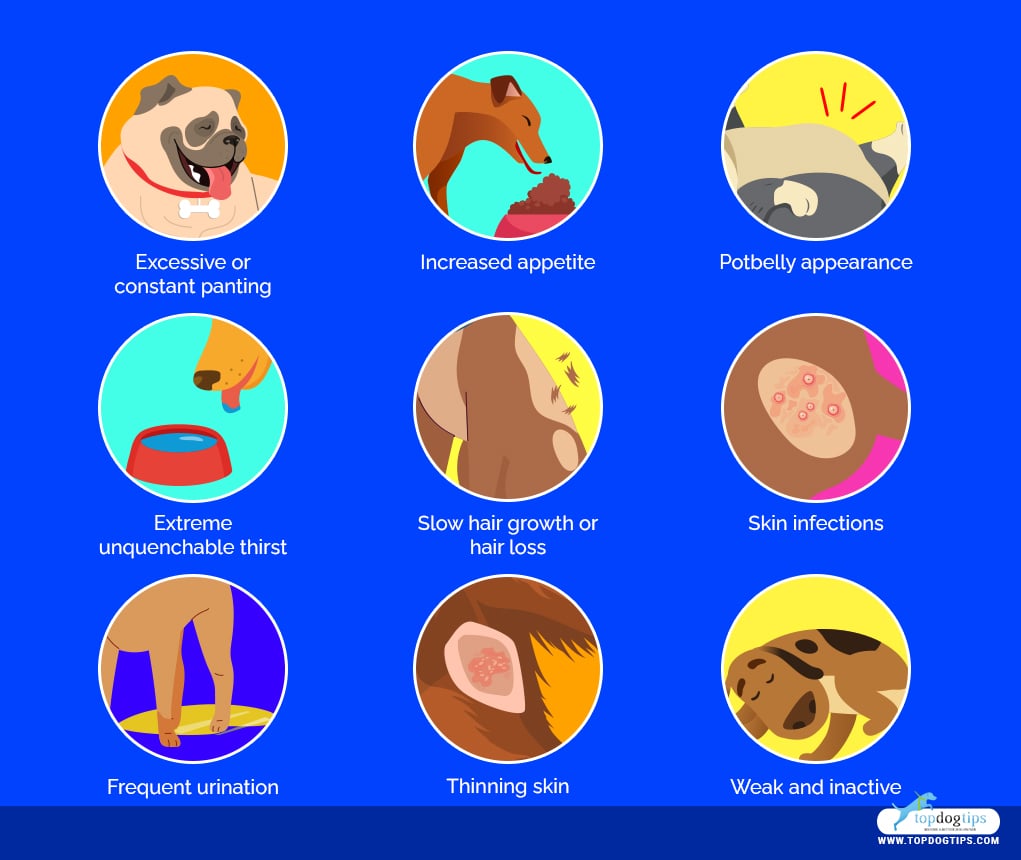
Unfortunately, this condition can be complex for the owner to detect as there aren't obvious symptoms such as fainting and coughing.
Instead, the symptoms of Cushing's Disease in dogs can seem like typical issues that come along as your dog gets older.
Some research even suggests that canines that have been spayed or neutered are more at an increased risk of developing this condition.
Below are the most common symptoms of Cushing's Disease:
Excessive or constant panting
This symptom is due to an imbalance of cortisol, also known as the stress hormone. High levels of cortisol affect the immunity and organs, in this case, the lungs.
Increased appetite
Negative emotions attributed to weakness in movement may increase your dog's food intake. It will cause them to eat more even if they've eaten enough already.
Potbelly appearance
Their potbelly appearance is usually from excessive bloating, one of the after-effects of too much cortisol hormone secretion.
Extreme unquenchable thirst
This symptom results from the abnormality of hormones within their body, particularly the lack of antidiuretic hormone.
The pituitary gland produces this hormone. It is also called polydipsia.
Slow hair growth and frequent hair loss
The slow hair growth and frequent hair loss are due to the decreasing hormone DHEA (dehydroepiandrosterone), secreted by the adrenal glands.
Skin infections and thinning skin
Skin problems are also a consequence of imbalanced cortisol.
Frequent urination
Also known as polyuria, this symptom results from hormonal imbalance, such as unquenchable thirst.
Weak and inactive
Weakness and inactiveness are an effect of excess cortisol production; muscle spasms will be frequent, and your pet may have muscle weakness, which will lead to their inactivity.
All the symptoms above are very similar to those experienced by humans with Cushing's Disease.
In addition, some studies found that the condition is almost identical between humans and dogs in how symptoms present themselves.
Who Can Suffer from Cushing Disease?
Cushing's Disease occurs in dogs, most commonly in middle-aged and older canines. Almost all dogs diagnosed with Cushing Syndrome are over eight years old, with the median age being ten.
Although Cushing's Disease in dogs is primarily due to excessive cortisol production by the pituitary and adrenal glands, veterinarians have accidentally induced others.
One thing that veterinarians do is giving cortisone injections to dogs.
Cortisone is used in dogs to treat several conditions like skin problems, allergic reactions or inflammations, and Addison's Disease. However, excessive cortisone may initiate Cushing's Disease in dogs.
And, if you thought that was strange, wait until you hear an even rarer cause – steroid-containing ear drops.
Furthermore, certain dog breeds suffer from a genetic predisposition to Cushing's Disease. The breeds most commonly observed as predisposed to this include:
- Poodle, especially Miniature Poodles
- Boxer
- Yorkshire Terrier
- Beagle
- Scottish Terrier
- Dachshund
- German Shepherd
- Labrador
- Boston Terrier
- Staffordshire Terrier
RELATED: Addison's Disease in Dogs: The Guide for Pet Owners
Diagnosing Cushing's Disease in dogs
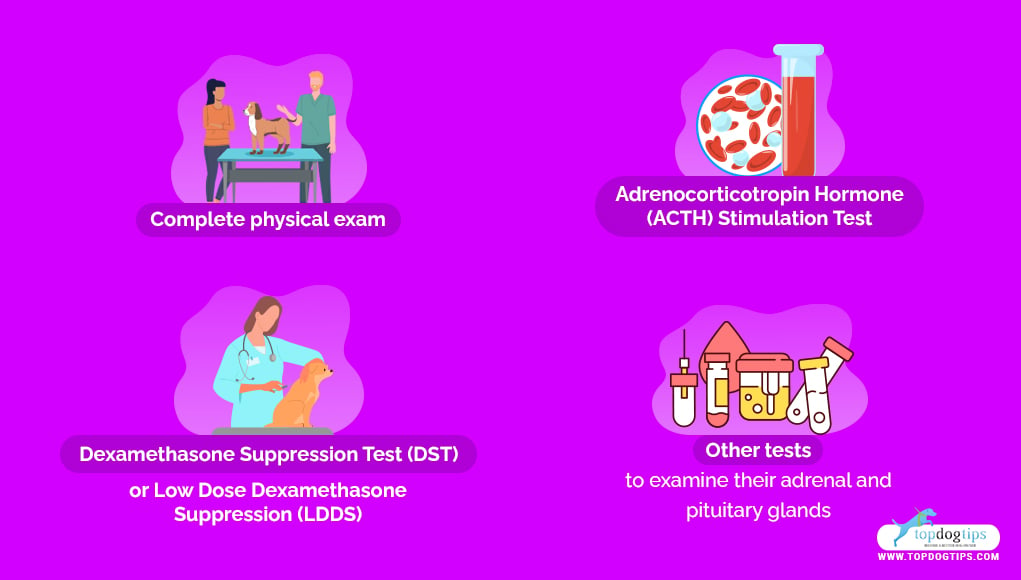
To diagnose Cushing's Disease in dogs, your veterinarian will need to perform a complete physical exam.
They'll also have to find out the canine history to see whether the symptoms correlate with normal aging or whether something has gone awry or suspicious.
First, your veterinarian will conduct urine, saliva, or blood tests for elevated cortisol levels or cortisol secretion.
Suppose it shows a high level of cortisol.
In that case, they can then perform what we call the Adrenocorticotropin Hormone (ACTH) Stimulation Test.
An ACTH Stimulation test will determine whether or not the excess cortisol level in your dog is due to Cushing's Disease or something else.
They could also perform a Dexamethasone Suppression Test (DST), also known as Low dose dexamethasone suppression (LDDS).
It's a test to check hormone production stability, particularly cortisol levels.
They use blood samples from your dog to determine if their cells will react to dexamethasone, a synthetic version of the hormone.
They may also perform an ultrasound to dig deeper to find the culprit.
Believe it or not, liver, spleen and gastrointestinal disease have overlapping symptoms.
Gallbladder disease needs to also be ruled out.
However, the tests mentioned above are not the only ones your dog will likely go through since many other diseases have similar symptoms.
The most reliable way to diagnose cushing's syndrome is magnetic resonance imaging or MRI for short.
That will examine their pituitary and adrenal glands.
READ: 18 Tips on How to Save Money on Dog Care, Health, Vet Bills, and Meds
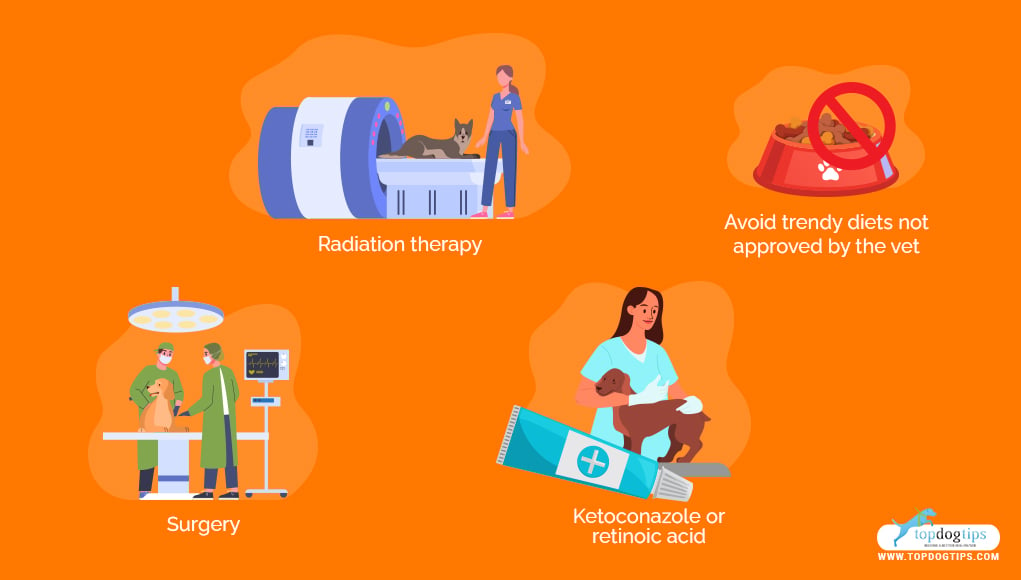
Treatment for Cushing's Disease in dogs
As noted above, Cushing's Syndrome is due to a tumor growing in the pituitary or adrenal gland. Now it could be a benign or malignant tumor.
According to research, where the tumor is benign, and surgery is an option, the recovery prognosis from the Disease is very high.
In some inoperable cases, medication treatments or radiation therapy might be a better option.
Radiation therapy can sometimes shrink the tumor when the owner chooses not to go for the surgery.
When the tumor shrinks, it will alleviate the intensity of the symptoms.
In the case of taking medication, say for, Iatrogenic Cushing's syndrome the course of action looks a bit different.
Furthermore, consulting with your veterinarian will help you develop the best action plan on treating your dog's disease.
One study showed promising results when 42 dogs took ketoconazole or retinoic acid as a treatment. Read further to know.
Radiation Treatment for Dogs with Cushing's Disease
As mentioned earlier, radiation therapy is a non-surgical process for treating Cushing's Disease, reducing the tumor size.
Overall, this method improves their condition and lessens the pituitary tumor or the adrenal tumor on their immune system.
It isn't an effective way to remove the pituitary tumor or adrenal tumor itself, but rather only lessens the size of the tumor.
However, radiation treatment only serves as an option if your dog's tumor affects them neurologically—if it doesn't, you must skip this step for the safety of your dogs.
Bear in mind that a relapse may occur if this treatment is not administered regularly; thus, further endangering your dog's health.
Additionally, there are cases that it won't be effective, and they may need medical therapy.
Constant Medication
The hormone cortisol makes the body respond to a stimulus associated with stress.
Thus, medication treatments helps your dog achieve normal levels of cortisol without doing any surgical methods.
So have your vet prescribe medication and never miss a time to administer the medicine.
Iatrogenic CUshing's disease
In this instance, medication is required to be successfully treated. The dog will need to be slowly weaned off of the steroid that helped treat the disease.
The vet will also start your dog on medication to counteract the lack of the steroid. In order to get control of your dog's adrenal glands and cortisol under control your dog will need to come in for ACTH stimulation tests.
Follow up blood tests routinely are required for the remainder of your dog's life to manage their health condition.
Avoiding Trendy Diets If Not Approved by Your Veterinarian
It's essential to avoid any “fad” diets, such as Meat-Only Raw Food Diet, and consider the specific nutrient requirements the dog needs. Remember that only 11,000 years ago, our current day dog began to develop.
While starting as the noble wolf, they survived hunting and feeding on prey alone; today's dog has a much more complex digestive system. As a result, they can break down a more varied diet, including rice and potatoes.
There are advocates of Raw Diets/BARF/etc. that still argue that dogs should eat a diet dating back to their wolf ancestors, primarily raw meat.
However, studies confirm that dogs are healthier when eating a diet with more variety and nutrition, gaining more nutrients than the suggested diet.
Switching to Homemade Dog Food
Dietary changes are one of the necessary treatments. For example, dogs with Cushing Syndrome have shown remarkable improvement in their overall quality of life when switched from their regular processed diet to a homemade diet consisting of fresh vegetables and meat.
It's also beneficial to serve smaller meals every few hours instead of one large meal.
Owners of dogs with Cushing's Disease are often given a homemade meal plan from their veterinarian and encouraged to try the new diet for a period of one month to two months before discounting it.
Some of the Benefits That Come Along with Feeding Your Dog Homemade Food Include:
1. Knowing what's in your dog's food – With homemade dog food, you know precisely what your dog is getting—fresh, wholesome, human-grade ingredients with no additives, preservatives, and no extra bulking agents.
Processing food typically removes or destroys nutrients and fiber present in whole foods that remain healthy.
2. Allergy safe – Human and canine co-evolution doesn't stop at our bellies. An unfortunate predisposition that we share is allergies.
Just as we suffer from the corresponding sniffles, rashes, and tummy aches, our canine companions also can.
Your veterinarian can test your dog for allergies and help you find a diet plan that will meet his unique dietary requirements.
3. Lean body equals longer life – Sadly, our companion animals have also evolved to be susceptible to the same diseases that we battle with.
Struggles with obesity run rampant and are partly due to readily available processed food.
Several diseases are exasperated by weight gain, including Cushing Disease in dogs, diabetes, heart disease, and cancer.
In short, the healthiest way to live is to be lean.
4. Save money – Cooking with human-grade ingredients for your dog doesn't have to cost a lot.
For example, cooking from scratch once per week (or even once per month) and freezing portions can cost less than sacks of dog food for the same period.
Read more about the benefits and side effects of homemade dog food, and make sure you understand what a well-balanced homemade dog food meal consists of to avoid causing any further complications to your dog's health. Always discuss this with your veterinarian.
VIDEO GUIDE: How to Make Homemade Dog Food
Sample Cushing's Dog Food Recipes
Sample Cushing's Dog Food Recipes
Head over to our Dog Food Recipes Section for plenty of health and other dog food and dog treat recipes to get you started on your new home cooking adventure.
Below I'm sharing two popular recipes that are especially good for dogs suffering from Cushing's.
Beef, Sweet Potato, and Pea Dog Food
- 3 lbs (raw weight), beef, cooked
- 3 lbs sweet potato, cooked
- 2 1/3 lbs peas, cooked
- 7 teaspoons sunflower oil
Eggs, Macaroni, and Broccoli Dog Food
- 3 eggs, hard-boiled
- 1 cup macaroni, cooked
- 1 cup broccoli, cooked
These recipes will still depend on your dog's overall health condition. Thus, it is essential to have a serious discussion with your veterinarian to address this problem.
Home Remedies for Cushing's Disease in Dogs
While you must discuss any possible medical treatment with your vet, many owners and veterinarians swear by natural treatments to increase the quality of life for their affected canines.
However, it's important to note that these aren't out-and-out cures for Cushing's syndrome but rather manage the symptoms.
Also, remember that because these treatments are along the lines of the holistic veterinary area, there is no scientific evidence whether they will work for your dog or not.
1. Cushex
- Promotes Long-Term Endocrine...
- Improve Overall Health in your...
- High-Quality – To ensure...
- Safe, Effective Quality -...
- Formulated by Experts –...
According to the manufacturer and praise from other dog owners' reviews, this herbal remedy has been created purely for Cushing's Disease in dogs in mind.
It features some natural ingredients with a proven ability to boost adrenal and pituitary function. This supplement is suitable for dogs of all sizes, breeds, and ages.
2. Adrenal Harmony Gold
- ✅ BETTER QUALITY OF LIFE....
- ✅ ADRENAL GLANDS & CORTISOL....
- ✅ CUSHING'S. Cushing's...
- ✅ BALANCE. If your dog has...
- ✅ VETERINARIAN-FORMULATED....
Unlike Cushex, Adrenal Harmony Gold explicitly targets the symptoms of dogs living with Cushing's Disease. One vital point is that this herbal remedy claims to bring thirst and urination back to an average level in your dog.
Throughout my research, I saw plenty of anecdotal evidence in the form of numerous positive reviews of this product.
Owners praise the difference that this remedy has made in their dog's happiness.
3. Make Your Own
For those with a little more time on their hands, make your natural homemade remedies for Cushing's Disease in dogs by combining some of the herbs that assist in decreasing or altogether stopping specific symptoms.
But, again, remember that there is no scientific basis for the effectiveness of the below.
Here are some of the herbs that claim to help dogs with Cushing's Disease:
- Dandelion – Besides being a medicine for the liver and kidneys, Dandelion helps boost adrenal function and gives a good boost of vitamins and minerals to help with energy levels and vitality.
- Burdock – This lesser-known yet almost miracle herb is excellent for flushing toxins from the body and maintaining blood sugar levels.
- Sulfur – Especially helpful in reducing the excessive thirst that comes along with this condition.
- Astragalus – Another adrenal function booster, this herb also gives the immune system a much-needed boost.
- Si Miao San – This Chinese remedy works best for obese dogs that suffer from excessive panting due to their Cushing's. This herbal formula regulates insulin and improves digestion – but, most importantly, it decreases inflammation.
- Ginkgo Biloba – Ginkgo works in almost the same way as Si Miao San. However, some dogs take to one rather than the other. The best way to determine this is to consult your local Holistic Veterinarian.
- Mercurius – Another thirst quencher also works as a stress reliever for dogs becoming upset from sudden symptoms.
RELATED: 15 Cheap Ways To Prevent Most Common Health Issues In Dogs
Veterinary Treatment for Cushing's Syndrome
Although surgery is a well-sought treatment to remove both adrenal and pituitary tumors, several other medications can help your dog's Cushing's Disease, some of which have been proven studies to be quite effective.
The ultimate prescription will come down to your dog's specific needs.
The intensity of symptoms can vary significantly in Cushing's Disease, one of the few conditions requiring entirely different treatment depending on the severity, symptoms, and lifestyle.
As this medical ailment mainly affects older dogs, many owners choose to forego medical treatment. Instead, they decide to let their dogs live out their lives to the fullest.
Many owners who opt out of medical treatment will go above and beyond, taking up an immediate switch to 100% homemade dog food meals for their four-legged friends.
They usually try herbal remedies to help deal with symptoms as well.
FAQ
Is Cushing's Disease contagious?
No, it's not.
Cushing's Disease in dogs is caused by an imbalance of hormones, often due to a tumor on the pituitary or adrenal gland.
Therefore, you can be confident that this condition cannot be contagious, and you, or even your other dogs, will not contract it.
How Long Do Dogs Live With Cushing's Disease?
It's a very high mortality rate sadly once it's been diagnosed. A dog will most likely live only two years or less.
What's even more sad is that 90% of dogs that are diagnosed do not make it another four years post-diagnosis.
This means that only 10% will make it to the four-year milestone.
Cushing's Disease in Dogs: Final Thoughts
Fortunately, life with Cushing's Disease for your dog can still belong, enjoyable and free of much discomfort. The dog's chances of recovering from Cushing's Disease when diagnosed and undergoing special medical treatment are also high.
Still, the cost of veterinary bills may be pretty high and will require a lot of dedication.
Many assume that when a dog is diagnosed with Cushing's Disease, it's equivalent to a death sentence, but that's not the case at all.
This condition is a widespread occurrence in dogs (and horses), that the chances are you may know a dog suffering and not even realize it.
They may develop tumors, but as long as they are medication, they'll be better.
Your dog will be okay with an early and proper diagnosis. Furthermore, with or without removing the tumor surgically, you can access many choices like radiation therapy.
READ NEXT: 25 Most Serious Dog Health Symptoms That Cannot Be Ignored
Disclosure: We may earn affiliate commissions at no cost to you from the links on this page. This did not affect our assessment of products. Read more here and find full disclosure here.


